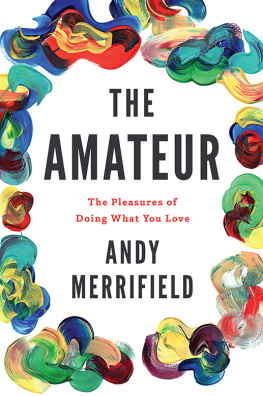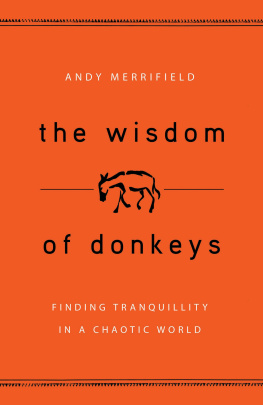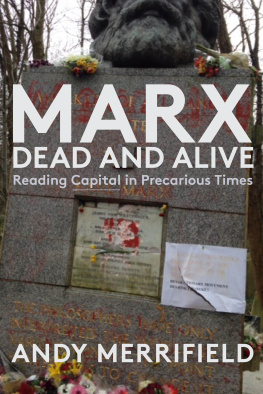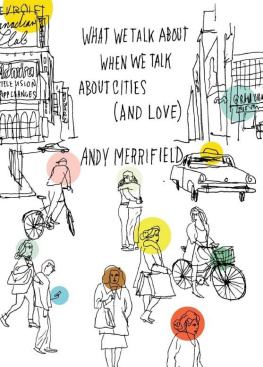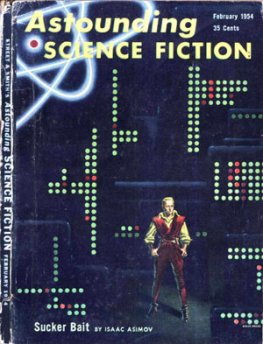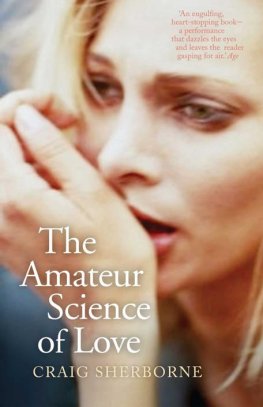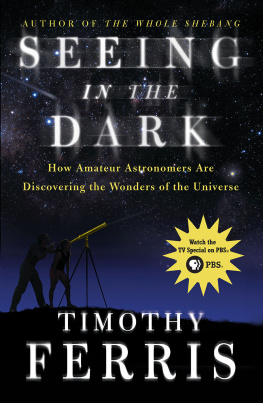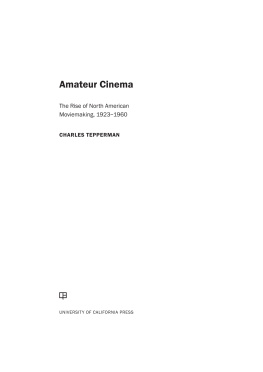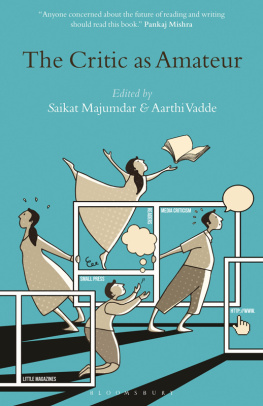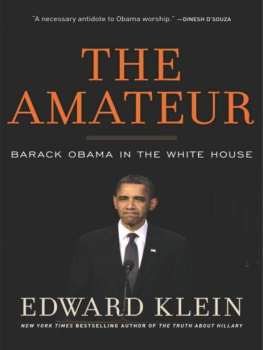THE
AMATEUR
The Pleasures of Doing
What You Love
ANDY MERRIFIELD

First published by Verso 2017
Andy Merrifield 2017
All rights reserved
The moral rights of the authors have been asserted
1 3 5 7 9 10 8 6 4 2
Verso
UK: 6 Meard Street, London W1F 0EG
US: 20 Jay Street, Suite 1010, Brooklyn, NY 11201
versobooks.com
Verso is the imprint of New Left Books
ISBN-13: 978-1-78663-106-0 (HB)
ISBN-13: 978-1-78663-451-1 (EXPORT)
ISBN-13: 978-1-78663-108-4 (UK EBK)
ISBN-13: 978-1-78663-109-1 (US EBK)
British Library Cataloguing in Publication Data
A catalogue record for this book is available from the British Library
Library of Congress Cataloging-in-Publication Data
Names: Merrifield, Andy, author.
Title: The amateur : the pleasures of doing what you love / by Andy Merrifield.
Description: London ; New York : Verso, 2017.
Identifiers: LCCN 2016050506 | ISBN 9781786631060 (alk. paper)
Subjects: LCSH: Amateurism. | Self-culture. | Hobbies.
Classification: LCC GV14.45 .M44 2017 | DDC 306.4/87dc23
LC record available at https://lccn.loc.gov/2016050506
Typeset in Fournier by MJ & N Gavan, Truro, Cornwall
Printed in the US by Maple Press
Our era of technicians makes abundant use of the nominalised adjective professional: it seems to believe that therein lies some kind of guarantee.
Guy Debord
Experts, he muttered, smiling scornfully. Snatching up his top hat, he shook his head bitterly and went out.
Anton Chekhov
For Corinna & Lili-Rose,
painters outside the lines
Contents
Professionals are everywhere. Little gets done nowadays without a professional expert offering their specially acquired knowledge: downscaling and evaluating, measuring and advising, scheming and sorting out life for millions of people the world over. Its as if everybody needs to get in on the act, to brand their whole personality as a compliant professional, to advance their career, to live a happy life. Its like were being told there are only two types of people: professionals (including wannabe professionals) and losers.
In this book, I want to challenge this order of things. I want to present an alternative category, the nemesis to the professional expert: the amateur. Here the amateur is both a real and an imagined category somebody who does exist today, but also someone who ought to exist. The amateur is a normative construct, a person whos lying latent in society, waiting to flourish. Theyre someone with an alternative sensibility, unwilling to fall for the expert scam, not feeling the need to sell themselves to the highest bidder. Theyre dedicated to doing things successfully and well yet without any great reward, sometimes without any reward at all.
In the accepted wisdom, we think of amateurs as people who dabble, who do things as a hobby rather than as a living, at weekends, in their spare time. They may be really good at something, experts in their own right at gardening, amateur dramatics, car mechanics but its still amusement, something unimportant. Professionals, by contrast, are those who apply themselves in important, instrumental ways. Theyre there to be listened to, taken seriously.
A staggering array of professional and expert bodies dominates our social, economic and political life. They preside over the implementation of social needs and the adjudication of public utility. Experts can be found at all levels of government and economic policy, in health systems and educational programmes. They formulate the algorithms of the business of science and write the language of the science of business. They oversee research and development and they squirrel away the benefits of patents and intellectual property rights. Consultants, advisors and think-tank wonks offer not-so-laissez-faire encouragement to our self-regulating, deeply undemocratic market system.
Professional experts instruct us about what we must learn and what we must read, what needs to be sold. They decide what aspects of public culture must to be written off, what benefits are without economic value, whose jobs are inefficient. Experts assert how we must present ourselves in public, how we must itemise the parameters of our work, how we must talk, how we must write. They know best about investing our money, if we have any, how much tax we should pay, what our legal rights are. Experts even provide guidance to politicians about how they should govern. Experts model our personalities, validate our hopes and desires, advise us how to live and how to die.
Its not that all experts are necessarily wrong; its more the mantle of power experts now assume, the degree to which they seem to rule unquestioned and supreme. Experts are both a new church and a new mafia, seducing and extorting at one and the same time, all the while equipped with their own irrational rationality of organisation, their largely unaccountable prowess.
In The Amateur, I want to intervene in the pervasive production, and acceptance, of this reality. I want to try to invent another reality, examine what amateurism means today and what it might mean. I shall do so by critiquing professionalism, staking out the fault lines that exist between amateurs and professionals, working through these fault lines thematically, shifting between personal identity and work relations, knowledge production and political power, technocratic representation and popular participation, urban studies and militant activism. I want to delve into the tensions between amateurs and professionals in each domain and show that these tectonic plates are, in fact, political divisions that can be reclaimed and moved.
Whenever I hear professional business types utter their marketing and management mantras, or professional academics talk about research assessments and finance, about grant money and committees, I feel the same sense of outsiderhood and stupefaction that Dostoevskys Underground Man feels on attending a reunion of his old school friends. Unlike him, theyre all successes, professionals whove amassed the rewards of status and commercial victories. But the Underground Man hates the harshly self-confident sound of their voices, and is struck by the pettiness of their thoughts, the stupidity of their pursuits, their games, their conversations.
They understand little about real life, he says, about the most essential things. They never read books and have no interest in the most inspiring, impressive subjects. They mistake rank for intelligence, and even at an early age were already thinking about snug positions. Theyve grown to worship success and want it for themselves. Everything honourable, but humble and downtrodden, the Underground Man says, they greet with disgraceful and unfeeling laughter, including the Underground Man himself. Their demeanour is superficial, affecting an air of cynicism. They blabber about excise duty, about business in the Senate, about salaries and promotions, about His Excellency, and the best means to please him, and so on, and so on.
Ever since my late teens, when I first read Dostoevsky, Ive identified with the Underground Man. At first it may have been because we were both frustrated clerks, ill-suited to what we were doing, or what we were supposed to be doing. Hed been a clerk for a while, in the Russian civil service; I was serving my time, in the late 1970s, as a wages clerk at the dock board in Liverpool, beholden to professional managers, to professional ways. We hit it off despite our epochal differences, despite our age gap and different tongues. Like him, I was rude and enjoyed being rude. It was all I could do for not taking bribes, for not wanting in. Later I was adrift, often between jobs between tiresome, pointless office tasks, managed by professionals. Most people thought I was lucky to have any job at all, but I hated it. I was a self-avowed Underground Man.

